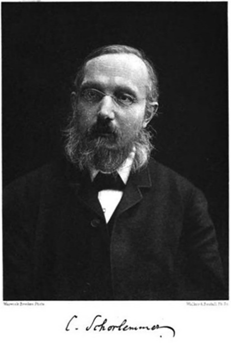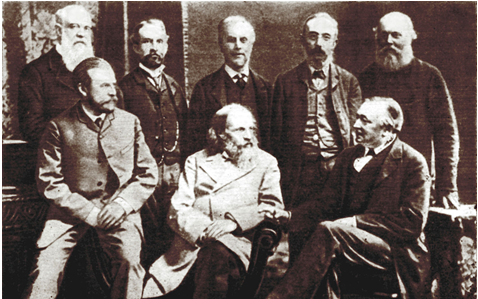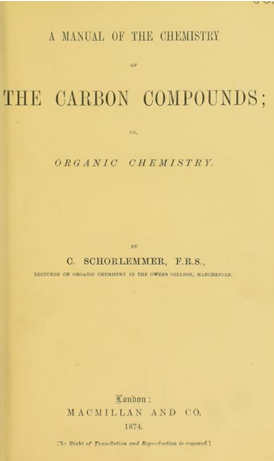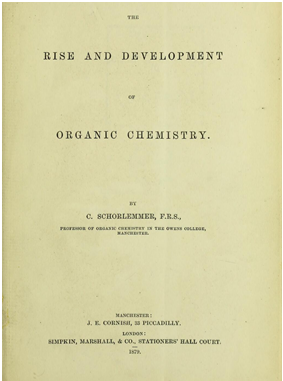INTRODUCTION
The important events in the Schorlemmer's life
Carl Schorlemmer (1834-1892) (Figure 1) was called “one of the founders of modern organic chemistry” (Maksimov, 1937a, p. 5). He was called “by his German friends as the “English Kopp”” (Roscoe, 1892, p. 395). He was a man who distinguished himself for “his theoretical & practical knowledge of the Science of Chemistry” (“Reference number EC/1871/10”, n.d.). One hundred and thirty years have passed since his death, but in that time very little has appeared in the literature about this eminent man. He went down in the history of chemistry as a researcher who “investigated the homologues of the aliphatic series and showed the relation of the hydrcarbons in a series to their substitution products” and also “discovered (1866) a general method for converting a secondary into a primary alcohol” (Smith, 1949, p. 229). He was also known for his books on organic chemistry and the history of chemistry.
Carl Schorlemmer was born at Darmstadt (Germany), on September 30, 1834, and he was the eldest of the nine children of Johannes Schorlemmer, a master carpenter from Darmstadt, and his wife Philippine (née Roth) (Duschek, 1984, p. 313; Maksimov, 1937b, p. 8; Schwarz, 2007).

Fig. 1 Carl Schorlemmer (1834-1892), as shown in Carl Schorlemmer, The Rise and Development of Organic Chemistry. Revised Edition. Edited by Arthur Smithells. (London, New York: Macmillan and Co., 1894).
He received his primary education at the Volksschule in his hometown. Then he moved to a four-year Realschule which he successfully completed. In 1850, he continued his education at the Darmstadt Höheren Gewerbeschule where he studied from the age of 16 to 19 (Duschek, 1984, p. 313). The first two and a half years at this school he devoted to general education, mathematics and natural sciences, new languages, and the last six months in a special class - mainly physics and chemistry (Maksimov, 1937b, p. 9). “There he distinguished himself by his intelligence and aptitude, and by the zealous and valuable assistance which he rendered in the Laboratory” (Schorlemmer, 1894, p. xi).
In the spring of 1853, he entered the Lindenborn apothecary's shop in Gross-Umstadt as an apprentice (Spiegel, 1892, p. 1108). Then, after two and a half years, he passed the Assistants' Examination, after which he left for Heidelberg, where he got a job as an apothecary's assistant in one of the pharmacies. At that time in Heidelberg, Robert Bunsen (1811-1899) played an outstanding role at the University. Working in a pharmacy, Schorlemmer listened to Bunsen's lectures in his spare time. ”These lectures and the growing drive for scientific work eventually led Schorlemmer to abandon the profession of pharmacist and take his studies seriously” (Maksimov, 1937b, p. 10). In May 1859, he began studies at the University of Giessen (Schorlemmer, 1894, p. xii).
His university studies in Giessen lasted only one semester. During this time, he took an experimental course in chemical analysis under the direction of Heinrich Will (1812-1890). He also attended lectures by Hermann Kopp (1817-1892), a famous specialist in the history of chemistry. “These lectures had a special impact on him because he himself had a passion for the deeply studying history, a science that fascinated him” (Maksimov, 1937b, p. 10).
In August 1859, Schorlemmer left the University of Giessen and took position of private assistant to the English Professor of Chemistry Henry Enfield Roscoe (1833-1915) (Wisniak,2016) at the Owens College, Manchester. He succeeded his close friend William Dittmar (1833-1892) in this position (Schorlemmer, 1894, p. xii). Roscoe in his autobiography (1906) wrote about it as follows:
When … [Dittmar] accepted the college demonstratorship [(1859-1861) (Roscoe, 1887, p. 6)] he advised me to ask a young German friend of his, Schorlemmer, to take his place as my private assistant, and, accepting my invitation, Schorlemmer came to Manchester, and continued much of the work which Dittmar and I had begun. I soon found that Schorlemmer was a man of great ability. He remained with me for thirty years; indeed, to the end of his life. Throughout that period we were much attached to each other; indeed, I do not think during the whole of that time we ever had a disagreement. We worked on the boiling-point of acids, a subject which has proved to be of considerable theoretical importance (p. 107).
In 1861, he became Demonstrator at the Owens College Laboratory (Harden, 1893, p. 757; Roscoe, 1887, p. 6). Twelve years later, in 1873, he was appointed Lecturer in Organic Chemistry (Hartog, 1900, p. 71;Roscoe, 1887, p. 6; Schwarz, 2007). The British chemist and historian of chemistry Sir Thomas Edward Thorpe (1845-1925) (Sztejnberg, 2021) in his biographical book on Roscoe (1916) described some of Schorlemmer's characteristics and his lectures:
Organic chemistry was hardly taught at Heidelberg in Roscoe's time, and then only by subordinate professors and privat-docenten, mainly to pharmacists. The effect of this training was seen in the subsequent character of his teaching. The lectures on organic chemistry that he was necessarily required to give at Owens College, with their limited possibilities of experimental illustration, simply bored him. Happily he [Roscoe] found in Schorlemmer a colleague who was glad to relieve him of the duty. Schorlemmer was not a fluent speaker, and although he wrote our language with ease and accuracy, he never acquired familiarity with the mysteries of its pronunciation. But he was an excellent teacher, remarkably well-read, and had an astonishingly retentive memory, and his lectures were thoroughly appreciated by the discerning student (p. 102).
In 1874, Schorlemmer was appointed Professor of Organic Chemistry (Roscoe, 1887, p. 6). He also headed a seperate chair of Organic Chemistry, which he held until his death (Brock, 2013, p. 211; Hartog, 1900, p. 9; Schorlemmer, 1894, p. xiii). (Roscoe, 1887) wrote in his book about Schorlemmer's work in the Chemical Departments of the Owens College as follows:
In due course Schorlemmer showed his mettle, succeeding Mr. Dittmar as College Demonstrator in 1861, and whilst continuing to discharge the duties of Senior Demonstrator for no less than thirteen years, he won for himself by his original investigations the position of one of the first Organic Chemists of the day. During the growth of our system of teaching, and whilst greater demands for a higher and more developed range of instruction arose, and whilst, at the same time, the boundaries of our science extended themselves enormously, it became plain that the work of properly professing the whole of the science had become too great for one individual, and at my request Mr. Schorlemmer was appointed Professor of Organic Chemistry in 1874, He was then, and is now, the only Professor of Organic Chemistry in the country; that is, in no other institution in the kingdom has it been thought worth while to encourage the study of the organic branch of our science, or to mark its great importance and extent by giving to it a distinct position, and there is no college or university in the country where so complete a course of lectures on Organic Chemistry is given as has been the case for years with us (pp. 13-14).
From 1879 Schorlemmer was an English citizen (Schwarz, 2007). He never got married (”Record. Schorlemmer; Carl”, n.d.). Some weeks before his death “symptoms pointing to a thoracic tumour manifested themselves and he was confined to bed” (“Professor Carl Schorlemmer”, 1892). He died at his house in Manchester, Lancashire on June 27, 1892, at the age of 58 (“Record. Schorlemmer; Carl”, n.d.) He was buried on the Southern Cemetery at Manchester on July 1, 1892 (Duschek, 1984, p. 314). Roscoe (1906) wrote about him as follows:
Schorlemmer was born at Darmstadt, the birthplace of many distinguished chemists. He came of poor parents, but by economy and hard work he secured an education which enabled him to attain a high position in the ranks of Science. He was neither an eloquent lecturer nor a neat manipulator, but his lectures were as full of sound matter as an egg is full of meat, and his experimental investigations were fruitful of good results. As an historian of the science, Schorlemmer was only second to Kopp, for his knowledge of both branches of chemistry was wide and accurate, whilst his sustained power of work, whether literary or experimental, was truly Teutonic (p. 107).
Schorlemmer's participation at the Manchester meeting of the British Association for the Advancement of Science
From August 31 to September 7, 1887, Schorlemmer participated as one of the vice-presidents of Section B (Chemical Sciences) at the 57th meeting of the British Association for the Advancement of Science in Manchester (“Report of the”, 1888a, p. lxviii).
Figure 2 is a photography made during this meeting. Schorlemmer is second from the right in the second row; to his left is the British physicist James Prescott Joule (1818-1889). To his right are the British chemist Edward Schunck (1820-1903), the German physicist Georg Quinke (1834-1924), and the German chemist Johannes Wislicenus (1835-1902). Seated from the left to right in the front row are the Russian chemist Nikolai Aleksandrovich Menshutkin (1842-1907), the Russian chemist Dmitri Ivanovich Mendeleev (1834-1907), and the English chemist Sir Henry Enfield Roscoe (1833-1915) (Solov'ev, 1984, p. 1071).

Fig. 2 Schorlemmer in the group of participants of the meeting in Manchester(“File:Mendeleev BAAS”, 1887).
Schorlemmer’s works
The list of works published by him includes a number of papers that appeared in print for twenty-three years from 1862 to 1885 (Dixon, 1893, pp.195-198; arden, 1893, pp. 761-763; Roscoe, 1887, pp. 42-44). The vast majority of these are the articles presenting the results of his experimental studies, published in the Journal of the Chemical Society and Proceedings of the Royal Society of London, and in other British and German journals. The Russian philosopher and historian of science Aleksandr Aleksandrovich Maksimov (1891-1976) in his article (1937b) wrote about Schorlemmer's works as follows:
All these works belong to one specific area, specifically to the field of paraffinic hydrocarbons and their derivatives, and are truly classic. These works soon created Schorlemmer European and even world fame in the field of organic chemistry and received an appropriate academic grade (p. 11).
Schorlemmer’s first work was published in 1862 and concerned the hydrides of the alcohol-radicles existing in the products of the destructive distillation of cannel coal (Schorlemmer, 1862). In another paper he described the chemical constitution of American rock oil (Schorlemmer, 1862-1863).
In 1863, he showed that no chemical difference exists between the hydrides and the so-called radicals (Schorlemmer, 1863). A year later, his paper on the identity of dimethyl (CH3-CH3) and hydride of ethyl (C2H5-H) was published in the Journal of the Chemical Society (Schorlemmer, 1864). He indicated “that the 4 combining powers [four valencies] of the Carbon atom have the same value” (“Reference number EC/1871/10”, n.d.).
He was an author of various other paper on Organic Chemistry, for instance on a new series of hydrocarbons contained in Coal-tar (Schorlemmer, 1867) and on the constitution of capryl alcohol from Castor oil (Schorlemmer, 1868d).
His original articles devoted to the Constitution the hydrocarbons of the series CnH2n+2 (alkanes), were published in the Proceedings of the Royal Society of London (Schorlemmer, 1865a; Schorlemmer, 1865b; Schorlemmer & Dale, 1865; Schorlemmer, 1868a; Schorlemmer, 1868b; Schorlemmer, 1868c; Schorlemmer, 1870a; Schorlemmer, 1871a; Schorlemmer, 1871b).
In 1869-1870, his two paper on the derivatives of propane were published (Schorlemmer, 1869; Schorlemmer, 1870b). In 1872, he pointed to the relation between the chemical structure and the boiling points of the normal paraffins (Schorlemmer, 1872a).
In 1872-1880, a series of his articles on normal paraffins were published (Schorlemmer, 1872b; Schorlemmer, 1878; Schorlemmer, 1880). In the years 1872-1879, his articles on normal paraffins were also published in German (Schorlemmer, 1872c; Schorlemmer, 1877a; Schorlemmer, 1879a).
In 1877, his paper written together with R. S. Dale on the transformation of aurin into rosaniline was published in the Journal of Chemical Society (Dale & Schorlemmer, 1877a). In the same year, this article was published in German in the Berichte der deutschen chemischen Gesellschaft (Dale & Schorlemmer, 1877b).
In one of the last articles written together with Thomas E. Thorpe, they described the results of the research on compunds obtained from heptane from Pinus Sabiniana (Schorlemmer & Thorpe, 1883).
Other works of Schorlemmer in chemistry
In 1874, the first English edition of his A Manual of the Chemistry of the Carbon Compounds; Or, Organic Chemistry (Figure 3) was published in London (Schorlemmer, 1874a). In the same year, this text-book was translated into Polish (Schorlemmer, 1874b) from the first German edition under the title Lehrbuch der Kohlenstoffverbindungen oder der organischen Chemie. Zugleich als Zweiter Band von Roscoe-Schorlemmer's Kurzen Lehrbuch der Chemie (Schorlemmer, 1871c). The third German edition of this text-book appeared in Braunschweig in 1885 (Schorlemmer, 1885a). The first Russian edition of the Schorlemmer's Manual appeared in Saint-Petersburg in 1873 (Shorlemmer [Шорлеммер], 1873; Krupskiy, 1900, p. 59), and the second editiopn was published in 1876 (Maksimov, 1937b, p. 12).
In 1877, Schorlemmer, together with Roscoe, published in German, the first volume of the most comprehensive manual to chemistry entitled Ausführliches Lehrbuch der Chemie (Roscoe & Schorlemmer, 1877). Aleksandr A. Maksimov (1937b) described this manual as follows:
This manual is actually “handbook”, written in a systematic manner - covers both general and organic chemistry. First two volumes were devoted to general chemistry. Starting from the third volume, this manual is dedicated to organic chemistry. Schorlemmer himself wrote entirely the third, fourth and part of the fifth volume. The entire edition is nine large volumes and was completed after Schorlemmer' death (p. 12).
The German edtion of the second volume of the Roscoe and Schorlemmer's Ausführliches Lehrbuch der Chemie appeared in Braunschweig in 1879 (Roscoe & Schorlemmer, 1879a). In 1884 and 1886, volumes III and IV, respectively, of the German edition were published (Roscoe & Schorlemmer, 1884; Roscoe & Schorlemmer, 1886).

Fig 3 Title page of Carl Schorlemmer's (1834-1892) A Manual of the Chemistry of the Carbon Compounds; Or, Organic Chemistry. (London: Macmillan and Co.1874).
After Schorlemmer's death, the chemist Julius Wilhelm Brühl (1850-1911), professor at the University of Heidelberg, continued to expand and refine this manual, from the publication of volume V in 1896 until the publication of volume nine in 1901 (Roscoe & Schorlemmer, 1896; Brühl, 1898; Brühl, 1899; Brühl, 1901a; Brühl, 1901b).
The manual of Roscoe & Schorlemmer's Ausführliches Lehrbuch der Chemie in English was published under the title A Treatise on Chemistry. The first edition of the first volume of this manual appeared in New York in 1878 (Roscoe & Schorlemmer, 1878). Three years later, in 1881, the second edition of this volume was published in New York and London (Roscoe & Schorlemmer, 1881). The second volume of the Treatise appeared in 1879 (Part I.) and in 1880 (Part II.) (Roscoe & Schorlemmer, 1879b; (Roscoe & Schorlemmer, 1880).
Henry E. Roscoe (1892) wrote about the collaboration with Schorlemmer at the time of writing Treatise of Chemistry:
I was especially fortunate in securing his [Schorlemmer] co-operation as co-author of the Treatise. The success of my little book-as to which no one was more surprised than myself-induced me to set about the task of writing a larger and more complete work. I soon found that the other very various and pressing duties of my position rendered it impossible for me to do all the work myself, an my friend Schorlemmer joined me in this somewhat laborious business. To him the organic part almost entirely owes its being, whilst in the inorganic portion his assistance and suggestions were most valuable. We published the book simultaneously in Germany and England, and it is not too much to say that in both countries the work has become a standard one. For the last few years of his life this was his main work (p. 395).
Schorlemmer 's works on the history of chemistry
In 1879, the first English edition of his The Rise and Development of Organic Chemistry (Figure 4) was published in Manchester and London (Schorlemmer, 1879b). The second English edition of this book appeared in 1894, two years after Schorlemmer's dead. It was prepared by the author himself. The Editor was Arthur Smithells (1860-1939) (Schorlemmer, 1894).
In 1885, this book was translated into French by Alexandre Claparède and published in Paris (Schorlemmer, 1885b). The first German edition of this book was published in 1889 (Schorlemmer, 1889). In 1937, it was translated into Russian from the second English edition (1894) by I. O. Baensky and published in Moscow (Shorlemmer [Шорлеммер], 1937).
A brief general chapter on the history of organic chemistry under the title Geschichtliche Entwickelung der Chemie is contained in the first volume of Roscoe and Schorlemmer's book entitled Ausführliches Lehrbuch der Chemie (Roscoe & Schorlemmer, 1877, pp. 1-33). The English version of this chapter entitled Chemistry. Historical Introduction is available in the first volume of A Treatise on Chemistry (Roscoe & Schorlemmer, 1878, pp. 3-40).
Schorlemmer was the author of two historical articles. The first was published in 1882 under the title On the Origin of the Word “Chemistry” (Schorlemmer, 1882) and the second, entitled The History of Creosote, Cedriret, and Pittacal was published in the Journal of the Society of Chemical Industry (Schorlemmer, 1885c).
CONCLUSION
Carl Schorlemmer was one of the important organic chemist and historian of chemistry of the second half of the XIX century. He worked in Germany and England. He lived in England 33 years. He achieved success in his short life. In 1870, at the age of 36, he became a member of the Manchester Literary and Philosophical Society (Maksimov, 1937b, p. 11). On June 8, 1871, he was elected a Fellow of the Royal Society of London (F.R.S.) (“the Record of”, 1912, p. 413). In 1878, he became a member of the American Philosophical Society (“List of Past”, n.d., p. 184). He was elected Doctor honoris causa of the Glasgow University (LL.D.) (1888) (“The University of”, n.d.). In 1887, he became a member of the British Association for the Advancement of Science (“Report of the”, 1888b, p. 89).
The Organic Chemistry Laboratory in the Department of Chemistry at the Owens College was opened in 1895 and named after Schorlemmer (Hartog, 1900, pp. 64-68;“The Schorlemmer Memorial”, 1895, pp.63-64).
Schorlemmer's scientific activities was carried out only in England. His textbook entitled A Manual of the Chemistry of the Carbon Compounds; Or, Organic Chemistry made him famous among chemists and chemistry students in many countries of the world. It was first published in German. Then was translated into Polish, Russian and English. His The Rise and Development of Organic Chemistry, first published in Manchester and London, later has been translated into French and Russian.
In 1870, Schorlemmer translated into German Roscoe's book entitled Spectrum Analysis. Six lectures, given in 1868, before the Society of the Apothecaries of London (Roscoe, 1869). It was published in Braunschweig (Roscoe, 1870).
After twenty years in England (1859-1879) he became a citizen of that country. “He believed in popular freedom and popular rights, and was a strong supporter of the German Social Democratic party, many of the leaders of this movement, both in Germany and in England, being his intimate friends” (Roscoe, 1892, p. 395). He was a close friend of the German philosophers Friedrich Engels (1820-1895) and Karl Marx (1818-1883) (Spiegel, 1892, p. 1123; Reinhardt & Travis, 2000, p. 81).
Carl Schorlemmer (1834-1892) made a permanent mark on the pages of the history of chemistry as one of the founders of modern organic chemistry.















